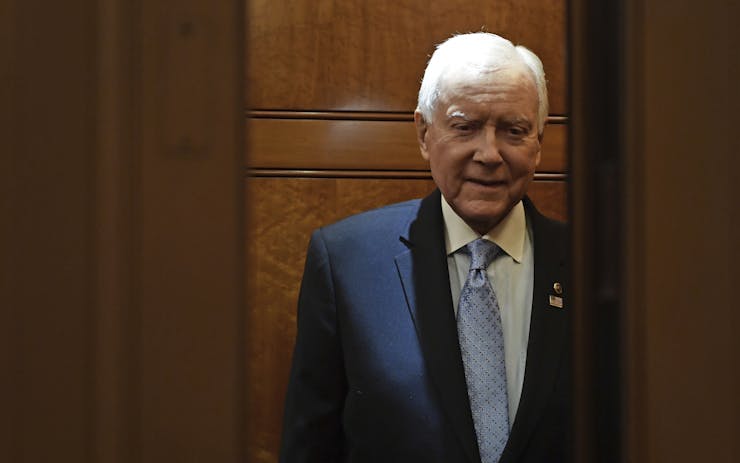Nothing announces the end of a year like a countdown, so allow me to commence my list of the Top Five Most Surprising Cannabis Stories of 2017.
5. The Canadian mandate requiring citizens to store personal-use cannabis under lock and key. (Upside: the creation of thousands of jobs for private-residence lockbox inspectors?)
4. The old-schoolhuffing and puffing of US Attorney General Jeff Sessions, who sought to revive a “War on Drugs” approach to cannabis but failed to rally anyone beyond the ghosts in his mind.
3. The fact that switching from flowery bong hits to concentrated dab hits will suddenly make the former taste like what comes out of a garbage truck’s exhaust pipe. (This is a personal news story and thus unlinkable, but it BLEW MY MIND.)
2. The multifaceted promise cannabis has shown in combatting the opioid epidemic
And at the top of the heap…
1. The abrupt evolution of Orrin Hatch, the longstanding Republican senator for Utah, who this fall punctuated his historic career of conservatism by coming out swinging for medical cannabis.
What inspired Hatch’s about-face? The same thing that’s inspired about-faces by so many reactionary holdouts: a friend.
“It’s high time to address research into medical marijuana,” said Hatch while introducing the Marijuana Effective Drug Study Act of 2017 in September. “Our country has experimented with a variety of state solutions without properly delving into the weeds on the effectiveness, safety, dosing, administration, and quality of medical marijuana. All the while, the federal government strains to enforce regulations that sometimes do more harm than good. To be blunt, we need to remove the administrative barriers preventing legitimate research into medical marijuana, which is why I’ve decided to roll out the MEDS Act.”
Bizarre overreliance on stoner allusions aside, the MEDS Act explicitly aims to “improve the process for conducting scientific research on marijuana as a safe and effective medical treatment,” from streamlining cannabis research to “requiring the Attorney General to increase the national marijuana quota in a timely manner to meet the changing medical, scientific, and industrial needs.”
This would be impressive from a lefty Democrat. From Hatch—who previously voted against decriminalizing possession of small amounts of cannabis and fought states seeking to establish medical marijuana programs—it’s borderline amazing.
What inspired Hatch’s about-face? The same thing that’s inspired about-faces by so many reactionary holdouts: a friend.
Hatch spoke of his inspirational friend—a young constituent with severe epilepsy—while introducing the MEDS Act in September.
“The current treatment for his condition, with no guarantee of success, would be invasive brain surgery,” said Hatch. “Compounds found in marijuana could significantly mitigate the severity of my friend’s seizures and even help him lead a normal life. But current regulations prevent the development of any such treatment from going forward. So this young man is left to suffer.”
All of us in the pro-cannabis community need to make space for (and have patience with) late bloomers finally seeing the light.
With this proclamation, Orrin Hatch became the most prominent example yet of an ever-more-common type: the anti-cannabis human whose mind is changed by the experience of someone they know.
For the last, irrational holdouts against medical marijuana, such direct personal connection to an MMJ beneficiary is apparently the only instructor.
On one hand, this is annoying. Must one’s personal belongings be engulfed in flames before one understands the need for a fire department? Couldn’t any one of the millions of Americans whose lives have been improved through medical marijuana sufficed as an inspirational example for Hatch?
Shop highly rated dispensaries near you
Showing you dispensaries nearOn the other hand, complaining about progress is a losing game, and all of us in the pro-cannabis community need to make space for (and have patience with) late bloomers finally seeing the light. They are a key component of the future of legal cannabis.
For now, let us bask in the inspirational words of Orrin Hatch, who wrapped his senate introduction of the MEDS Act by “[urging] my colleagues to join in our joint effort to help thousands of Americans suffering from a wide-range of diseases and disorders. In a Washington at war with itself, I have high hopes that this bipartisan initiative can be a kumbaya moment for both parties.”







